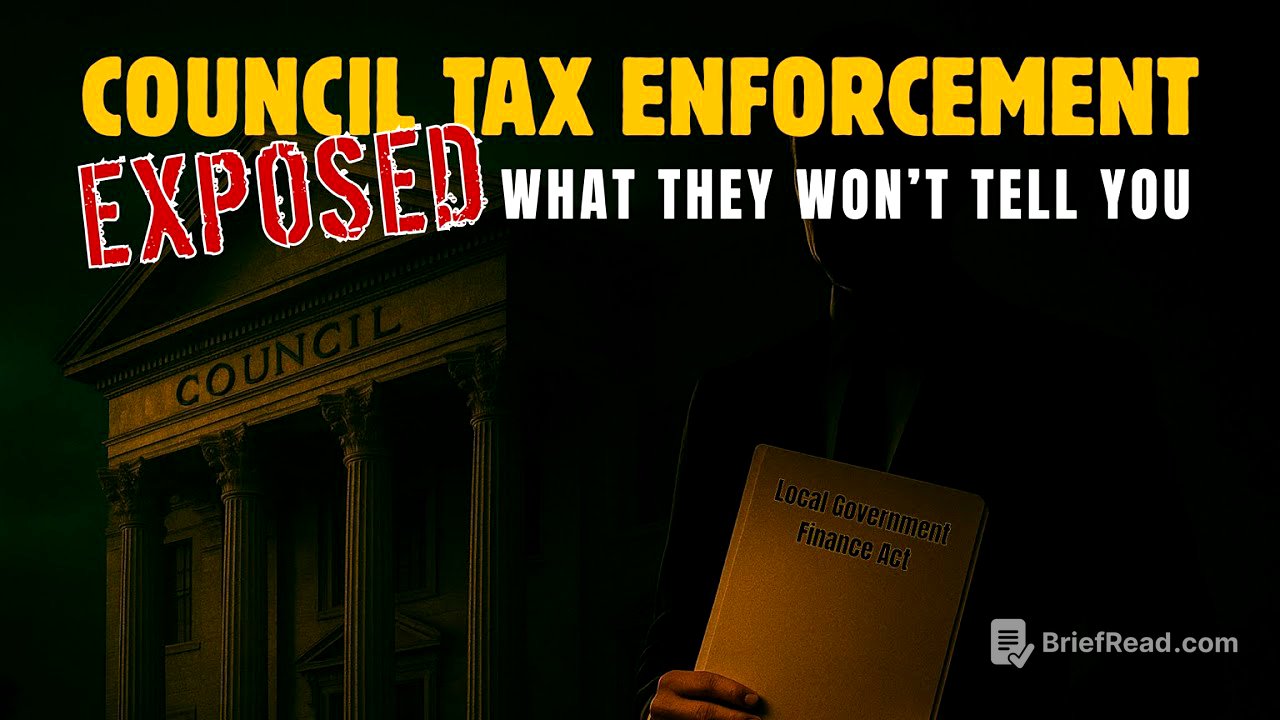TLDR;
This video reveals that UK councils may be unlawfully enforcing council tax collection by bypassing standard legal procedures. It argues that the 1992 Local Government Finance Act (LGFA) did not grant councils the power to enforce payments as debts without proper court judgments. Instead, councils are using minister-written regulations (statutory instruments) to convert statutory duties into enforceable debts, which circumvents constitutional protections like due process and fair hearings.
- Councils are enforcing payments as if judgments have been made, leading to wage deductions, property seizures, and bankruptcy proceedings without proper court oversight.
- The enforcement powers rely on the Council Tax Administration and Enforcement Regulations 1992, not the LGFA itself.
- Regulations 49 and 50 of these regulations are particularly problematic as they create a fiction of debt for bankruptcy and property seizure purposes, bypassing constitutional and human rights protections.
Introduction [0:01]
The video introduces the claim that councils across the UK are improperly enforcing council tax payments. They are allegedly draining bank accounts, garnishing wages, and threatening imprisonment without proper court judgments. The speaker asserts that the 1992 Local Government Finance Act, which introduced council tax, did not grant councils the authority to enforce payments in this manner. These actions are supposedly being carried out through minister-written regulations, which bypass constitutional protections. The speaker promises to explain the truth behind council tax enforcement, what the law actually says, and how rights may have been compromised by administrative shortcuts.
The Local Government Finance Act 1992 [1:19]
The Local Government Finance Act 1992 established council tax but did not create a new class of debt or authorize councils to enforce liability outside of court judgment. The Local Government Act 1888, section 78, subsection 2, clarifies that councils were never intended to perform judicial functions or impose punishments without judicial process. Section 79, subsection 2, of the same act raises questions about whether councils can inherit individual legal liabilities as corporations.
Council Enforcement Without Judgment [3:02]
Councils are currently enforcing payments as if a judgment has already been made, leading to wage deductions, enforcement agent visits, bankruptcy proceedings, charging orders on property, and threats of imprisonment without lawful authority. The video questions whether Parliament ever legislated to give councils such powers and examines the actual laws and constitutional allowances. The Local Government Finance Act 1992 creates a liability to pay council tax for property owners, but it does not define this liability as a debt or grant new enforcement powers that override constitutional protections.
Unlawful Enforcement Regulations [5:01]
The enforcement powers councils use today do not come from the LGFA 1992 itself but from a statutory instrument, a form of secondary legislation. Statutory instruments are regulations written and signed by a minister under delegated authority, without full parliamentary debate or vote. These instruments are meant for minor administrative matters, but in this case, they created an entire enforcement mechanism affecting property, wages, and liberty. The Council Tax Administration and Enforcement Regulations 1992 are what councils rely on to seize wages, property, apply for bankruptcy, place charging orders, and threaten imprisonment. Regulations 49 and 50 are particularly problematic, as they attempt to convert statutory liability into enforceable debt, bypassing constitutional and legal protections.
Regulation 49: Creating a Fiction of Debt [6:44]
Regulation 49 comes into effect once a liability order has been obtained through the magistrate's court, which is an administrative court, not a court of record. Regulation 49(1) states that where a liability order has been made and the debtor is an individual, the amount due shall be deemed a debt for the purposes of section 267 of the Insolvency Act 1986. This allows councils to treat council tax liability as an enforceable debt for presenting a bankruptcy petition in the county court, a jurisdiction intended for genuine civil disputes. This bypasses the constitutional protections of the county courts, as a creditor must prove a liquidated debt established through proper judicial proceedings and a civil judgment under section 267 of the Insolvency Act 1986. Regulation 49 sidesteps this requirement without independent judicial adjudication, adversarial hearing, or lawful judgment by a court of record, raising profound constitutional questions about using an administrative liability order to bankrupt individuals.
Regulation 50: Charging Orders Without Real Debt [9:03]
Regulation 50 allows councils to apply for a charge on a property based solely on a liability order, circumventing the requirement under the Charging Orders Act 1979 for a proper court judgment. This process lacks a civil trial and adversarial testing of evidence, representing a regulatory conversion of liability into enforceable debt by ministerial regulation rather than an act of parliament. This raises concerns about the lawfulness of the enforcement process and its compatibility with constitutional and human rights protections.
Constitutional and Human Rights Breach [9:55]
The power to enforce council tax in this manner was not legislated by parliament but created through secondary legislation, bypassing critical legal safeguards such as trials, judicial determination of fact, and opportunities to challenge liability. This violates historic constitutional guarantees like Magna Carta 1297, the observance of due process of law 1368, and the Bill of Rights 1688, as well as modern protections under Article 6 of the European Convention on Human Rights. Liability orders granted without trial and judicial scrutiny do not meet the standards required under Article 6, and no regulation can lawfully bypass these protections.
Enforcement and the Law of Debt [11:32]
Lawful enforcement must follow proper structure, requiring a court judgment debt before seeking to charge property under the Charging Orders Act 1979 and basing bankruptcy on a liquidated proven debt through the courts under the Insolvency Act 1986. Liability orders, however, are issued without trial, granted in bulk, and involve no adversarial hearings or real judicial inquiry. When councils use liability orders to pursue bankruptcy, charging orders, or property seizures, they may be bypassing both statutory protections and fundamental constitutional principles, exposing the entire council tax enforcement system to serious constitutional challenge.
Final Thoughts [12:30]
The Local Government Finance Act 1992 gave councils a duty to collect tax, not the power to bypass the Constitution or Human Rights Law. Individuals cannot be stripped of their income, home, or liberty without due process of law. If facing enforcement, one should ask to see a court judgment, not just a liability order, and demand due process. Public servants and solicitors have a duty to uphold the law, the constitution, and the rights of the people they serve. Knowingly enforcing unlawful practices may amount to misfeasance in public office or a breach of professional duty. The video concludes by emphasizing that the constitution still reigns and encourages viewers to defend their rights and share this information.









